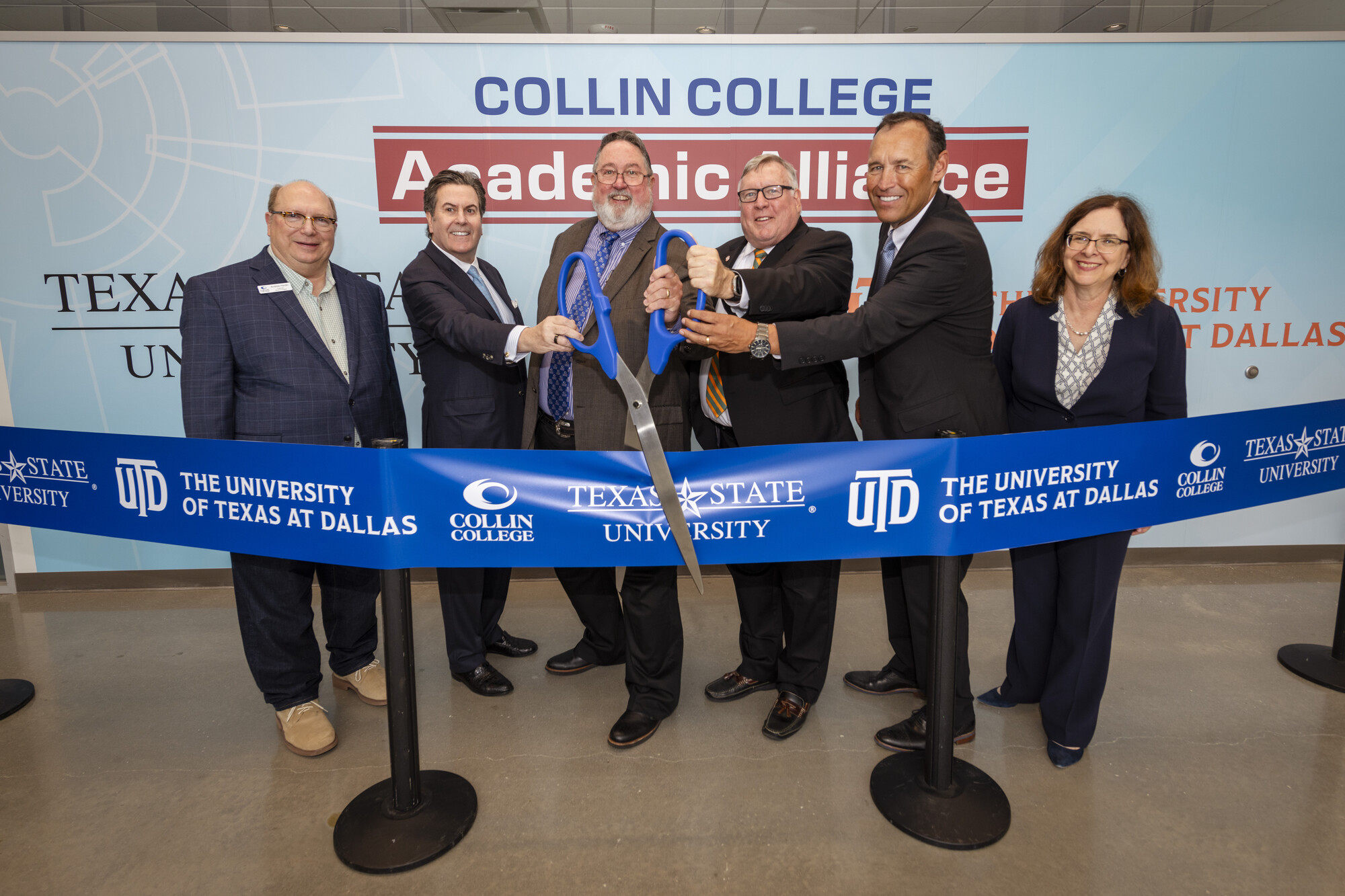Texas State University, The University of Texas at Dallas, Collin College launch Academic Alliance
August 13, 2024
Cougar News

Texas State University, The University of Texas at Dallas, and Collin College have launched the Collin College Academic Alliance. This innovative partnership will provide area residents with the opportunity to earn an associate degree, seamlessly earn a bachelor’s degree*, and save thousands of dollars. The program will have full academic support from Collin College and partner universities, allowing students to complete their full Texas State or UT Dallas degree in Collin County.
Located at the Collin College Technical Campus in Allen, the Alliance partnership creates outstanding opportunities for its students, including saving them about $20,000. Students can take many Collin College courses that are approved to apply to university degree programs.
“At Texas State University, we are proud of our unwavering belief in the power of education to transform lives and communities,” said Texas State University President Dr. Kelly Damphousse. “We know that our shared mission with Collin College makes us great partners to support the incredible population growth in and around Collin County. Students will not just attend our classes at Collin’s Technical Campus, but they will also be a part of the Texas State experience while saving thousands of dollars through this agreement.”
This new endeavor provides the community with a new higher education model.
“The University of Texas at Dallas is proud to be at the forefront of significant initiatives, and this collaboration is no exception,” said The University of Texas at Dallas President Dr. Richard C. Benson. “We have a longstanding, robust relationship with Collin College, and together we are paving the way for students to succeed.”
Collin College will serve as the hub of the Alliance, providing the location, advisors, and a full complement of student support services. Alliance students will have access to dining services, a library, and a campus bookstore as well as central student support services including: academic advisement, career services, counseling, and disability services.
“We are thrilled to take our partnerships with Texas State University and The University of Texas at Dallas to a new level,” said Collin College District President Dr. Neil Matkin. “This alliance creates true streamlined pathways that guide students from Collin College degrees to top programs at exceptional universities while offering tremendous cost savings.”
Alliance students will receive a variety of partner university perks ranging from library services to football game tickets. Students will also have opportunities to participate in Collin College student organizations and receive similar opportunities to attend local fine arts and athletic events.
In addition, Collin College will be working with Academic Alliance partners in the near future to explore additional programs, including education certification programs.
For more information about the Collin College Academic Alliance, visit www.collin.edu/academics/alliance.
About Texas State University
Founded in 1899, Texas State University is among the largest universities in Texas
with an enrollment of more than 38,000 students on campuses in San Marcos and Round
Rock. Texas State’s 230,000-plus alumni are a powerful force in serving the economic
workforce needs of Texas and throughout the world.
About The University of Texas at Dallas
Home to more than 30,000 students, The University of Texas at Dallas is an innovative
institution in the heart of North Texas. UT Dallas offers rigorous academic programs,
with curricula serving a variety of undergraduate and graduate student interests.
With seven schools offering more than 145 undergraduate and graduate programs, plus
professional certificates and fast-track programs, UTD also is recognized as an R1
institution – a Carnegie Classification of Institutions of Higher Education denoting
the top tier of doctoral institutions with very high research activity.
About Collin College
Collin College serves more than 58,000 credit and continuing education students annually
and offers more than 200 degrees and certificates, including a Bachelor of Science
in Nursing (BSN), a Bachelor of Applied Technology (BAT) in Cybersecurity, a Bachelor
of Applied Science (BAS) in Construction Management, and a new Bachelor of Applied
Science (BAS) in Clinical Operations Management. The only public college based in
Collin County, Collin College is a partner to business, government, and industry,
providing customized training and workforce development. For more information, visit www.collin.edu.
*Pending approvals from the Texas Higher Education Coordinating Board and the Southern Association of Colleges and Schools Commission on Colleges
Back to Newsroom
